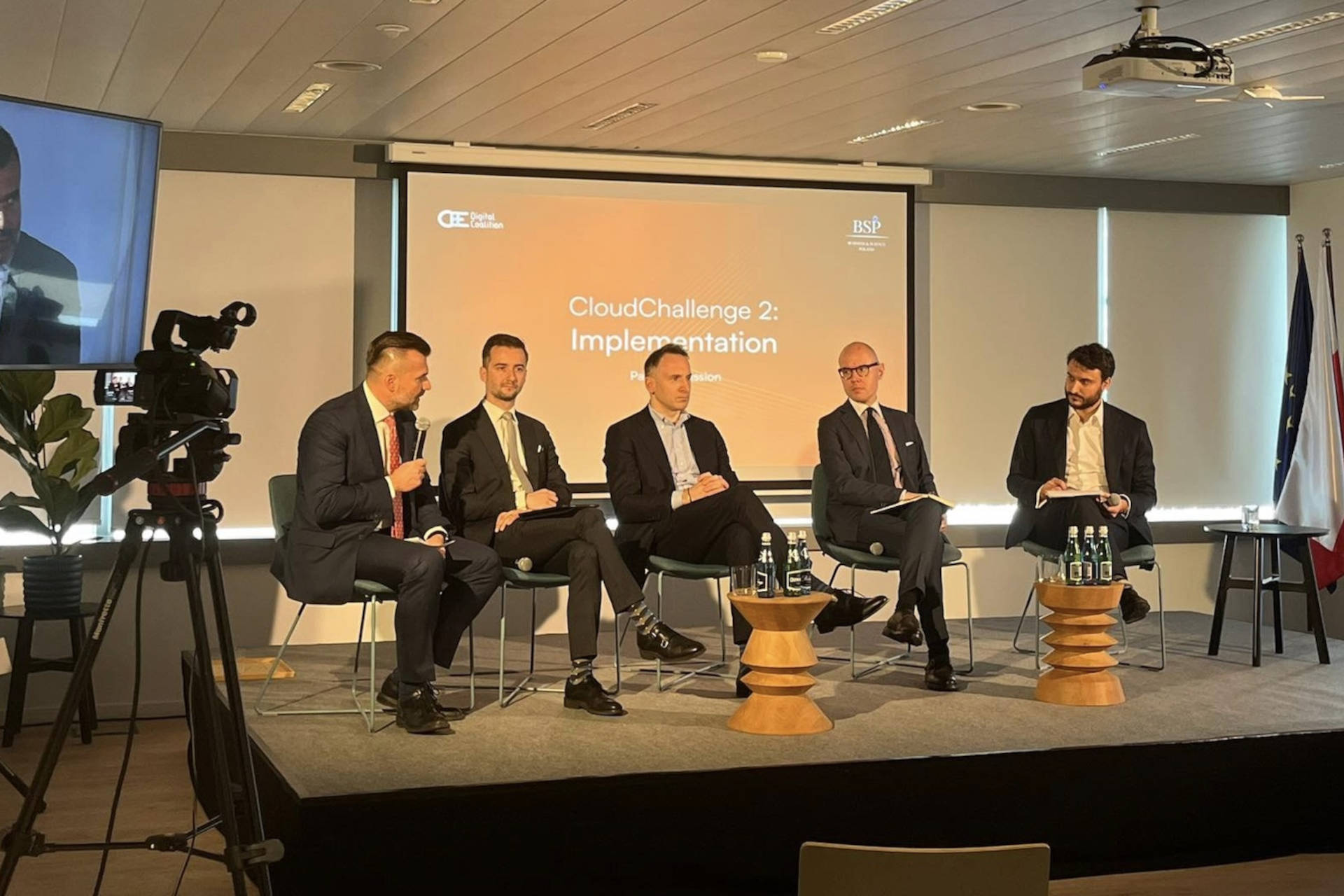#CloudChallanger: Fragmentation of the regulations and insufficient competences among the potential users, remain the main obstacles to deploying cloud solutions

Cloud technologies are among the most important elements of the EU's digital transformation. Creating clear regulations - both at national and EU level - is an essential part of this process. Building and developing digital competences - which many local authorities, representatives of SMEs, but also individuals still lack - must not be forgotten," said the President of Digital Poland Association, Michał Kanownik, during the #CloudChallanger conference in Brussels.
The #CloudChallanger conference took place on 23 March. The event, organised at the headquarters of Business & Science Poland, was attended by representatives of the European Commission, authorities of Central and Eastern Europe (CEE) countries, digital industry experts, as well as by the cloud and cyber security specialists from public agencies and private companies. Experts shared a regional perspective on the future of the cloud in their countries and the entire EU during the conference.
The experts spoke about the challenges of deploying cloud solutions in Europe. They agreed that there are no coherent and transparent regulations, both at the national and at the EU level. Michał Kanownik, President of Cyfrowa Polska (Digital Poland Association), opened the discussion by stating that overegulation should be avoided. He also stated that the transatlantic partnership should be kept in mind when discussing new legislations. “We need to avoid over-regulation. We especially need to avoid introducing regulations that will be difficult to comply with for the American companies, it is very important for our transatlantic alliance” – he pointed out.
Digital Europe representative - Alberto Di Felice - highlighted the consequences of legislative fragmentation in Europe. “We still face high regulatory fragmentation. So the project of the single digital market must be there” – he spoke in context of the broader, pan-European digital transformation. “The fragmentation creates huge problem regarding scaling-up: both on the cloud-producers’ and the cloud customers’ sides” –he noted.
Di Felice added that “currently there are many brilliant legislative ideas on the table but we must get this balance right – there are many get intentions, but we have to remain careful”. As he explained, “each legislative creates new framework – you have to make sure you don’t create more hurdle than you try to solve”.
The panellists touched on public procurements issue and pointed out that they play a big role in the digital transformation process. According to Di Felice, they can have a developmental effect, but they also carry the risk of creating further barriers. “There are still many illogical scenarios existing in the legislation” – thinks the Digital Europe’s representative. This thought was elaborated by Kanownik, who sketched the situation in Poland. “For local authorities it is difficult to compare the available cloud-services, as the representatives often lack the needed skills. Sometimes they don’t even know how the construct a suitable contract” - Kanownik said.
Michał Kanownik noted that the problem of insufficient digital skills exists not only among the local authorities, but also among the average people. Both groups “often don’t trust the clouds’ security”. According to Robert Bogdanoff from the Romanian digital sector’s association ANIS, cloud implementation at the state level “will not hinder the security, it will increase it”.
Experts pointed out that the problem of insufficient competence also affects the SME sector. “The war in Ukraine and the pandemics have put a lot pressure on companies to become more digital. The general picture looks good. But then again, in Poland 20-30% of the SMEs don’t even consider digital transformation” – Kanownik reminded. “We should turn to the SMEs. But it is an extremely complex market. There is over 2 million of such entities in Poland, they are not integrated” – Marcin Nowacki, the president of European Enterprise Alliance, pointed out.
The debate participants listed the issues they believe should be tackled by the states as a priority. “We need clear data classification system generally applicable in the public sector – this will help with the cloud adoption more than anything else. Then, the usage of the public cloud should be easy and accessible to all authorities willing to use advanced software solutions” – believes Bogdanffy, who focused on the officials’ fears regarding the data security. Also Kanownik mentioned the need for transparency of regulations. “Firstly, presenting very clear regulations on how the local authorities and the SMEs can use the available digital services, especially cloud services, is required. Secondly, reduction of long administrative processes is needed” – he enumerated, and added that providing funds for the digital competences’ development should not be neglected.
“Member states must be bold and they must know what the concerns. They must differentiate when to act in a more European fashion and when to understand that things, which politically and ideologically sound correct, are simply not doable. Sometimes we need to scale-back and take those baby-steps that in a few years will put us in a much better place” – Alberto Di Felice summed up.